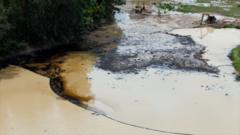Ecopetrol, Colombia’s leading oil company, has been accused of extensive pollution across over 800 sites, sparking outrage over environmental negligence. Investigative efforts by the BBC World Service have uncovered that the company, despite its claims of compliance with sustainability practices, is responsible for severe contamination of water sources and wetlands that are vital to the region’s biodiversity.
Data leaked by whistleblower Andrés Olarte, a former adviser to the company’s CEO, indicates that significant instances of pollution were never reported, with up to one-fifth of the incidents concealed from authorities. The leaks date from 1989 to 2018, revealing a pattern of oil spills that has persisted into recent years, with local aquatic life impacted by the hazardous substances entering their habitats.
“The situation is awful,” Olarte noted, explaining that he observed alarming data on pollution soon after starting with Ecopetrol in 2017. Though Olarte sought clarification from management, he faced dismissal of his concerns, leading to his departure in 2019. He provided the data to the Environmental Investigation Agency (EIA) and later to the BBC, which has confirmed its authenticity.
In areas surrounding Barrancabermeja, the company’s main refinery, locals report terrible consequences for wildlife. Fisherfolk express alarm, highlighting the strange odor of the fish caught in oily waters and the discovery of dead endangered species like manatees and capybaras in the surrounding wetlands. Equally troubling is that Ecopetrol appears to have shifted blame for its pollution onto external factors like sabotage, despite evidence of its own negligence.
The recovered database from Ecopetrol reveals a staggering number of unresolved environmental impacts dating back over a decade, leaving vital ecosystems critically affected. Even as the company claims to have rectified 95% of these incidents, independent data suggests that oil spills are still rampant, with hundreds reported each year.
Under pressure from conservationists and impacted communities, Ecopetrol states it has adequate management processes for pollution incidents and emphasizes its significance for Colombia's energy needs. However, activists continue to face threats for voicing their concerns, underscoring the dangerous nexus between environmental defense and armed groups in Colombia.
Despite the risk, community leaders like Yuly Velásquez remain steadfast, affirming their right to advocate for their livelihoods and the environment. “If we don’t fish, we don’t eat,” she asserts, highlighting the dichotomy of existence faced by many in affected areas—speak out and risk death, or remain silent while the environment deteriorates.
Amid this turmoil, Ecopetrol's leadership publicly denies any wrongdoing, asserting they engage in human rights evaluations and maintain transparency in their operations. Yet, the conflicting stories raise serious questions about environmental stewardship and corporate responsibility in Colombia’s oil industry.
Data leaked by whistleblower Andrés Olarte, a former adviser to the company’s CEO, indicates that significant instances of pollution were never reported, with up to one-fifth of the incidents concealed from authorities. The leaks date from 1989 to 2018, revealing a pattern of oil spills that has persisted into recent years, with local aquatic life impacted by the hazardous substances entering their habitats.
“The situation is awful,” Olarte noted, explaining that he observed alarming data on pollution soon after starting with Ecopetrol in 2017. Though Olarte sought clarification from management, he faced dismissal of his concerns, leading to his departure in 2019. He provided the data to the Environmental Investigation Agency (EIA) and later to the BBC, which has confirmed its authenticity.
In areas surrounding Barrancabermeja, the company’s main refinery, locals report terrible consequences for wildlife. Fisherfolk express alarm, highlighting the strange odor of the fish caught in oily waters and the discovery of dead endangered species like manatees and capybaras in the surrounding wetlands. Equally troubling is that Ecopetrol appears to have shifted blame for its pollution onto external factors like sabotage, despite evidence of its own negligence.
The recovered database from Ecopetrol reveals a staggering number of unresolved environmental impacts dating back over a decade, leaving vital ecosystems critically affected. Even as the company claims to have rectified 95% of these incidents, independent data suggests that oil spills are still rampant, with hundreds reported each year.
Under pressure from conservationists and impacted communities, Ecopetrol states it has adequate management processes for pollution incidents and emphasizes its significance for Colombia's energy needs. However, activists continue to face threats for voicing their concerns, underscoring the dangerous nexus between environmental defense and armed groups in Colombia.
Despite the risk, community leaders like Yuly Velásquez remain steadfast, affirming their right to advocate for their livelihoods and the environment. “If we don’t fish, we don’t eat,” she asserts, highlighting the dichotomy of existence faced by many in affected areas—speak out and risk death, or remain silent while the environment deteriorates.
Amid this turmoil, Ecopetrol's leadership publicly denies any wrongdoing, asserting they engage in human rights evaluations and maintain transparency in their operations. Yet, the conflicting stories raise serious questions about environmental stewardship and corporate responsibility in Colombia’s oil industry.


















